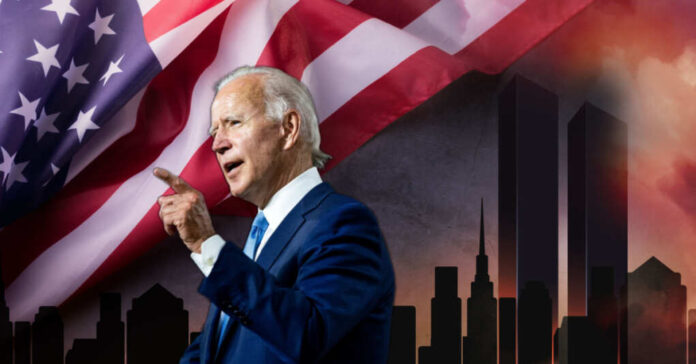
On the solemn anniversary of September 11th, a day etched into the collective memory of every American, President Joe Biden’s actions have raised significant concerns. Notably, he chose to skip the memorial services commemorating this tragic event, making him the first sitting president since the event to do so.
New Yorkers, most deeply affected by the events of 9/11, were given an appearance by the wildly unpopular Vice President Kamala Harris as a form of consolation prize that no one wanted. Biden’s absence speaks volumes about his priorities and commitment to honoring the memory of those lost on that fateful day.
Instead of standing with fellow Americans to remember and pay tribute to the victims of 9/11, President Biden delivered his speech in Alaska. While addressing various issues is undoubtedly part of his presidential duty, there’s a time and place for everything.
September 11th is a day reserved for reflecting on the lives lost and the resilience of a nation that emerged stronger from the ashes of Ground Zero. It’s a day to unify and stand in solidarity, not to prioritize other engagements over a solemn remembrance of our shared history.
Moreover, President Biden’s actions on this significant day extend beyond his absence at the memorial services. His administration’s dealings with Iran are deeply troubling. Providing billions of dollars to a regime with a history of supporting terrorism and destabilizing the Middle East raises serious questions about our national security interests.
The Biden administration has reached an agreement with Iran involving a prisoner exchange and the release of $6 billion in frozen Iranian funds. Under the terms of the deal, Iran will free five American citizens held in Iran, and the U.S. will release five Iranian citizens detained in the United States. Additionally, the agreement facilitates the transfer of $6 billion in frozen Iranian funds from South Korea to Qatar, exempted from U.S. sanctions.
Secretary of State Antony Blinken approved the deal, but Congress was only informed of the decision on the 22nd anniversary of the 9/11 terrorist attacks. Critics, such as Behnam Ben Taleblu of the Foundation for Defense of Democracies, argue that releasing these funds could encourage Iran to continue taking hostages and overlooks the reasons for freezing the funds initially, which included concerns about funding Iran’s nuclear and military programs.
Senator Joni Ernst of Iowa raised concerns that the $6 billion payout could ultimately benefit the Islamic Revolutionary Guard Corps and its proxies.
To make matters worse, the negotiation for the release of five Americans held captive in Iran resulted in the freeing of five Iranian “citizens” currently being held in the United States. It is nothing short of ironic and, frankly, deeply disheartening that on the very day that marks the worst terrorist attack in U.S. history, the Biden administration made a deal that effectively swapped American hostages for individuals who, in some way or another, have posed a threat to our national security.
Kambiz Attar Kashani, a dual US-Iranian citizen, faced a 30-month prison sentence for sending electronic equipment and technology to Iran, including its Central Bank, via front companies in the UAE. Mehrdad Ansari, an Iranian resident of the UAE and Germany, received a five-year prison sentence for his involvement in obtaining dual-use items that could be used for military purposes and nuclear weapons development, violating the Iranian trade embargo. Reza Sarhangpour Kafrani, an Iranian residing in Montreal, faced charges for illegally exporting laboratory equipment to Iran.
Amin Hasanzadeh, an Iranian national and US permanent resident, was indicted for stealing confidential information from his employer and sending it to his brother in Iran, who had military ties. Kaveh Lotfolah Afrasiabi, a Boston-based political scientist, was charged for violating the law requiring foreign agents in the US to register with the government, as he was found to have been secretly paid by Iran’s mission to the United Nations while lobbying US officials.
The administration is known for terrible negotiations, most notably obtaining a release for an Olympic athlete detained in Russia while leaving an American school teacher, an American reporter, and an American corporate security executive behind. But never have those negotiations been an insult to a city still in mourning.
The events surrounding 9/11 should serve as a stark reminder of the importance of unwavering commitment to the safety and values of the United States. President Biden’s actions on this day, from his absence at the memorial to the questionable negotiations with Iran, leave many Americans rightfully concerned about the direction in which our nation is headed. It is essential for our leaders to prioritize the memory of 9/11 and the safety of our citizens above all else, and on this occasion, it appears that these priorities were misplaced.
